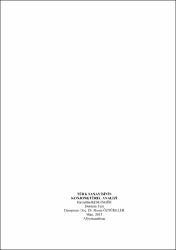| dc.contributor.advisor | Öztürkler, Harun | |
| dc.contributor.author | Kesgingöz, Hayrattin | |
| dc.date.accessioned | 2017-02-21T12:35:32Z | |
| dc.date.available | 2017-02-21T12:35:32Z | |
| dc.date.issued | 2013 | |
| dc.date.submitted | 2013 | |
| dc.identifier.uri | http://hdl.handle.net/11630/4399 | |
| dc.description.abstract | Sanayi sektörü ileriye ve geriye doğru bağlantı etkileri, GSYH’ya katkısı, istihdama katkısı ve ihracata katkısı yönünden en önemli sektördür. Bu nedenle sanayi sektöründeki konjonktürel dalgalanmalar önem kazanmaktadır. Birçok iktisatçı sanayi sektöründeki konjonktürel dalgalanmayı, özellikle daralma dönemlerini ekonomik krizle özdeş saymaktadırlar. Bu çalışma bu nedenle sanayi sektöründeki konjonktürü nedenleri ve sonuçları çerçevesinde bütün yönleri ile incelemektedir.
Türkiye ekonomisindeki konjonktüre yönelik yapılan çalışmalar makroekonomik bir çerçeve içerisinde kalmaktadır. Bu çalışma sektörel bir analiz olması yönünden literatüre bir katkı niteliğindedir. Türk sanayisinin konjonktürel analizi iki yöntemle gerçekleştirilmiştir. Birinci yöntemde üretim ve istihdam verilerinden yola çıkılarak imalat sanayi, madencilik ve elektrik, gaz, su alt sektörlerinin 1923–2010 dönemi için konjonktürel analizi yapılmıştır. İkinci yöntemde ise imalat sanayinin 1963–2010 dönemi için potansiyel çıktı temelli konjonktürel analizi yapılmıştır. Çalışmanın bulgularına göre incelenen dönemde imalat sanayinde 8 konjonktür devresi vardır. Ortalama konjonktür devresi süresi 6 yıldır. En kısa devre 3 yıl (1965–1967, 1988–1990, 1991–1993 ve 2008–2010), en uzun devre ise 10 yıl (1968–1977, 1978–1987 ve 1998–2007) sürmektedir. Türk sanayisinde Kitchin ve Juglar dalgalanmaları görülmektedir. | en_US |
| dc.description.abstract | Industrial sector is the most important sector in terms of its forward and backward linkages with other sectors and its contributions to gross domestic product, employment, and export. Therefore, business cycles in industry are crucially important. Many economists see business cycles in industry, especially downturn periods, as the economic crises periods. This dissertation examines all aspects of industrial business cycles in terms of causes and consequences.
Most of the empirical analyses of business cycles in the Turkish economy are in a macroeconomic framework. This dissertation makes a contribution to the literature by covering a sub-sector of the economy. Business cycles in the Turkish industrial are analyzed by two methods. In the first method, by using output and employment variables we study business cycles in manufacturing, mining, and electricity-gas-water sub-sectors of the industrial sector for the period between 1923 and 2010. In the second method, we study business cycles in the manufacturing sector in more detail on the basis of output gap measure we developed for the period from 1963 to 2010. According to our findings there are 8 cycles in the manufacturing during the period covered. Average duration of the cycle is 6 years. The shortest cycle lasts 3 years 1965–1967, 1988–1990, 1991–1993 ve 2008–2010), while the longest cycles lasts 10 years (1968–1977, 1978–1987 ve 1998–2007). Kitchin and Juglar’s fluctuations observed in the Turkish industry. | en_US |
| dc.language.iso | tur | en_US |
| dc.publisher | Afyon Kocatepe Üniversitesi Sosyal Bilimler Enstitüsü | en_US |
| dc.rights | info:eu-repo/semantics/openAccess | en_US |
| dc.subject | Konjonktür | en_US |
| dc.subject | Kriz | en_US |
| dc.subject | Potansiyel Çıktı | en_US |
| dc.subject | Sanayi Sektörü | en_US |
| dc.title | Türk Sanayisinin Konjonktürel Analizi | en_US |
| dc.title.alternative | Business Cycles Analysis Of The Turkish Industrial | en_US |
| dc.type | doctoralThesis | en_US |
| dc.department | Afyon Kocatepe Üniversitesi Sosyal Bilimler Enstitüsü İktisat Anabilim Dalı | en_US |
| dc.authorid | TR116905 | en_US |
| dc.relation.publicationcategory | Tez | en_US |



















